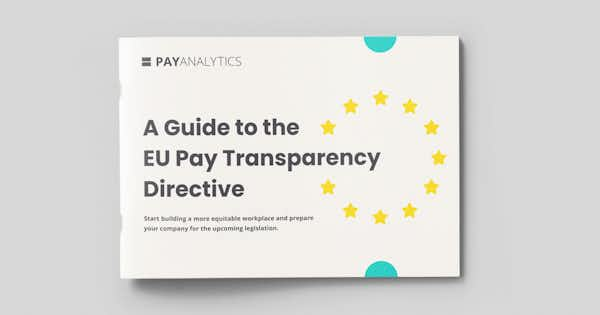Cómo prepararse para la Directiva europea sobre transparencia salarial | Obtén nuestro E-book gratis
Mide

Análisis de igualdad salarial
La igualdad salarial ayuda a clarificar las estructuras salariales al identificar los factores que determinan la remuneración, lo que permite tomar decisiones informadas y avanzar con confianza.
Resumen de todas las funciones del producto
Alcanza tus objetivos de igualdad salarial con el software PayAnalytics, que está diseñado para que puedas empezar a utilizarlo con una configuración mínima, y cuenta con tutoriales en vídeo y documentación fácil de entender.
Análisis de la igualdad salarial
Descubre los factores que influyen en la remuneración y toma decisiones informadas.
Comparación basada en el valor
Compara puestos de trabajo diferentes basándote en el principio de «igualdad salarial por trabajos de igual valor».
Análisis del personal
Examina y mejora la diversidad, guía eficazmente tus esfuerzos de DEI dentro de tu organización.
Medidas de solución
Obtén recomendaciones personalizadas para cerrar las brechas salariales, adaptadas a tus necesidades y presupuesto.
Informes
Herramientas esenciales para el cumplimiento global e informes personalizables para el equipo directivo.
Asistente de remuneración
Ayuda a mantener un lugar de trabajo libre de prejuicios y garantiza buenas decisiones en materia de retribución.
Gestión de los datos
Perfecciona fácilmente los datos subidos a PayAnalytics con correcciones, modificaciones y adiciones, y asegura la precisión y la visibilidad.
Valoración de puestos de trabajo
Construye estructuras salariales objetivas, compara diversos puestos basándote en el valor organizacional.
Controles de acceso de los usuarios
Controles de acceso detallados, porque los usuarios tienen diferentes necesidades de acceso a los datos.

¿Tienes todo listo para la Directiva de la UE? Hemos elaborado un libro electrónico para ayudarte a cumplir los nuevos requisitos.
Centro de aprendizaje
Hemos creado un centro de aprendizaje para ayudarte a navegar por el mundo de la igualdad salarial, la DEI y el análisis del personal. Puedes encontrar artículos, libros electrónicos descargables, podcasts y mucho más.
Guías y libros electrónicos
Explora nuestras guías y descubre consejos prácticos para lograr la igualdad en el lugar de trabajo. Hay tanto artículos extensos como libros electrónicos.
Artículos y blogs
Mantente al día sobre la igualdad salarial, la transparencia salarial, la igualdad en el lugar de trabajo, las estrategias de comunicación y las tendencias actuales.
Requisitos locales
No te pierdas ningún cambio en el panorama jurídico y descubre qué normativas se aplican a tu caso.
Charlas de café
Las últimas noticias sobre igualdad salarial en solo 8 minutos; cada dos viernes con Margret Bjarnadottir y Henrike von Platen.
Historias de éxito de los clientes
Descubre cómo otras empresas han cerrado la brecha salarial con PayAnalytics.

PayAnalytics adquirido por beqom
PayAnalytics anuncia su adquisición por parte de beqom, proveedor líder de sistemas de remuneración total y gestión del rendimiento.
Sobre PayAnalytics
Creemos que el salario es más que un número. Nuestro software se basa en más de una década de investigación y desarrollo de profesores, expertos en igualdad salarial e ingenieros galardonados.
Carreras profesionales
Únete a nuestro equipo de profesionales apasionados y altamente cualificados. Somos pioneros en nuestro campo, ayudando a las empresas a crear lugares de trabajo justos.
Noticias
Últimas actualizaciones de la empresa, como eventos, noticias de clientes, comunicados de prensa y mucho más.
Recursos de marca
Obtén una visión general de nuestra marca, premios e historia. Descarga recursos y fotos de la marca.
Asociaciones
Trabajamos con varios socios para promover la transparencia y la igualdad en las prácticas salariales. Explora las oportunidades de asociación.
Servicios de consultoría
Servicios de consultoría a medida para la implementación de la equidad salarial, diseñados para complementar y potenciar el uso de nuestro software.
Resumen de todas las funciones del producto
Alcanza tus objetivos de igualdad salarial con el software PayAnalytics, que está diseñado para que puedas empezar a utilizarlo con una configuración mínima, y cuenta con tutoriales en vídeo y documentación fácil de entender.
Análisis de la igualdad salarial
Descubre los factores que influyen en la remuneración y toma decisiones informadas.
Comparación basada en el valor
Compara puestos de trabajo diferentes basándote en el principio de «igualdad salarial por trabajos de igual valor».
Análisis del personal
Examina y mejora la diversidad, guía eficazmente tus esfuerzos de DEI dentro de tu organización.
Medidas de solución
Obtén recomendaciones personalizadas para cerrar las brechas salariales, adaptadas a tus necesidades y presupuesto.
Informes
Herramientas esenciales para el cumplimiento global e informes personalizables para el equipo directivo.
Asistente de remuneración
Ayuda a mantener un lugar de trabajo libre de prejuicios y garantiza buenas decisiones en materia de retribución.
Gestión de los datos
Perfecciona fácilmente los datos subidos a PayAnalytics con correcciones, modificaciones y adiciones, y asegura la precisión y la visibilidad.
Valoración de puestos de trabajo
Construye estructuras salariales objetivas, compara diversos puestos basándote en el valor organizacional.
Controles de acceso de los usuarios
Controles de acceso detallados, porque los usuarios tienen diferentes necesidades de acceso a los datos.
Centro de aprendizaje
Hemos creado un centro de aprendizaje para ayudarte a navegar por el mundo de la igualdad salarial, la DEI y el análisis del personal. Puedes encontrar artículos, libros electrónicos descargables, podcasts y mucho más.
Guías y libros electrónicos
Explora nuestras guías y descubre consejos prácticos para lograr la igualdad en el lugar de trabajo. Hay tanto artículos extensos como libros electrónicos.
Artículos y blogs
Mantente al día sobre la igualdad salarial, la transparencia salarial, la igualdad en el lugar de trabajo, las estrategias de comunicación y las tendencias actuales.
Requisitos locales
No te pierdas ningún cambio en el panorama jurídico y descubre qué normativas se aplican a tu caso.
Charlas de café
Las últimas noticias sobre igualdad salarial en solo 8 minutos; cada dos viernes con Margret Bjarnadottir y Henrike von Platen.
Historias de éxito de los clientes
Descubre cómo otras empresas han cerrado la brecha salarial con PayAnalytics.
Sobre PayAnalytics
Creemos que el salario es más que un número. Nuestro software se basa en más de una década de investigación y desarrollo de profesores, expertos en igualdad salarial e ingenieros galardonados.
Carreras profesionales
Únete a nuestro equipo de profesionales apasionados y altamente cualificados. Somos pioneros en nuestro campo, ayudando a las empresas a crear lugares de trabajo justos.
Noticias
Últimas actualizaciones de la empresa, como eventos, noticias de clientes, comunicados de prensa y mucho más.
Recursos de marca
Obtén una visión general de nuestra marca, premios e historia. Descarga recursos y fotos de la marca.
Asociaciones
Trabajamos con varios socios para promover la transparencia y la igualdad en las prácticas salariales. Explora las oportunidades de asociación.
Servicios de consultoría
Servicios de consultoría a medida para la implementación de la equidad salarial, diseñados para complementar y potenciar el uso de nuestro software.

Artículos y blogs
Aquí encontrarás artículos dedicados a promover la igualdad en el lugar de trabajo, la transparencia salarial y las prácticas de diversidad, equidad e inclusión (DEI). Desde consejos prácticos hasta análisis detallados de los cálculos de la brecha salarial de género y los beneficios de las prácticas salariales justas para la atracción y retención del talento, nuestros recursos están diseñados para apoyar a las organizaciones y personas comprometidas con el progreso hacia la igualdad en el lugar de trabajo.
- Artículo
Over the last several years, Portugal has strengthened its pay equity laws. They emphasize transparency, and employers with gender pay gaps may be asked to create a pay equity evaluation plan. This short article provides information to help employers in Portugal be prepared and proactive.
- Artículo
Japan has the largest gender pay gap of any G7 nation. To promote workplace equality, keep women in the labor force after childbirth, and increase advancement opportunities, the country recently made changes to its pay gap reporting requirements.
- Artículo
PayAnalytics’ new Workplace Equity feature helps organizations move beyond equity in pay alone. This feature helps companies analyze diversity and representation among current employees, new hires, and employees who exit the organization, and it looks for demographic differences in who receives raises and promotions.
- Artículo
- Equidad salarial
In 2023, Washington State expanded its pay transparency requirements by creating the Equal Pay and Opportunities Act (EPOA). Rather than disclosing a job’s minimum pay when making an applicant a job offer, the EPOA requires employers to disclose pay ranges in the job posting. In 2025, an amendment was passed to give employers a short window to correct noncompliant postings, to reduce statutory damages for noncompliance, and to clarify the wage information required in postings.
- Artículo
In summer 2022, Ireland implemented a far-reaching pay equity legislation, the Gender Pay Gap Information Act 2021. This legislation requires employers to begin reporting on their gender pay gaps. Companies will need to report differences in the mean and median pay between male and female employees. And if there’s a pay disparity, the company will need to provide a written explanation for it and outline any steps planned to close the gap.
- Artículo
As pay transparency laws continue to gain traction across the US, California employers are getting ready to comply with the state’s new pay reporting and pay disclosure law. It was signed by Governor Newsom on September 27, 2022.
- Artículo
PayAnalytics looks back on a productive 2022. We rolled out several new features to support customers on their pay equity journeys, and we celebrated big milestones for several of our customers. In addition, our team presented at conferences and published their research to promote pay equity worldwide.
- Artículo
Companies hiring in New York City have been changing the way they advertise job openings in response to the new pay transparency law. The New York City pay transparency law's effective date was November 1, 2022, and since then, companies with four or more employees must post the pay range for every job posting. The law covers all NYC-based companies. It also covers companies beyond city limits posting remote jobs that may be filled by NYC-based workers.
- Artículo
Hoy en día las brechas salariales demográficas son un problema al alza, ya que las organizaciones y los gobiernos buscan soluciones para garantizar la igualdad retributiva. El concepto «brecha salarial» se usa a menudo para denominar dos conceptos. Pero ¿cuál es la diferencia entre la brecha salarial ajustada y la no ajustada?
- Artículo
At PayAnalytics, we often talk about equal pay for work of equal value. Canada’s Pay Equity Act, implemented August 2021, takes a unique approach to achieving this objective. Typically, pay equity requirements focus on how men and women doing similar jobs are paid, but Canada now focuses on the value of the job to the employer.
- Artículo
Last week, our founders David Anderson and Margret Bjarnadottir presented their academic work at the WorldatWork Workplace Equity Forum 2022 in Austin, Texas.
- Artículo
"With the right tools, supported with the right data, we can bring about workplace transformation and pay equity."
In the latest issue of Dynamic Magazine, our founder Margrét shares valuable insights for leaders using data analytics or AI on their pay equity journeys.
Suscríbete a nuestra Newsletter
Nuestra newsletter cubre temas como la igualdad retributiva, los salarios y las prestaciones, el concepto DEI (diversidad, equidad e inclusión) y los cambios legislativos, así como noticias sobre nuestra empresa y las actualizaciones de nuestro software.











